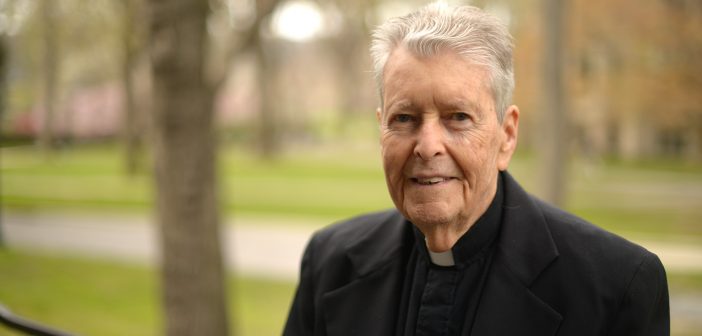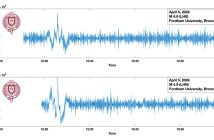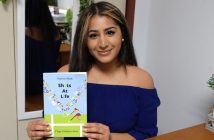Daniel Sullivan, S.J., FCRH ’50, professor emeritus of biology, first set foot on the Rose Hill campus as an undergraduate in 1946. In the course of a career spanning five decades, he earned a Ph.D. in entomology at the University of California, Berkeley, and traveled to nearly every continent on the planet to conduct research on invasive species, particularly insects.
Fordham News caught up with Father Sullivan for a podcast from his Jesuit residence on the Rose Hill campus. He touched on the ways his faith complemented his research, what it takes to make it in science today, and the importance of setting and sticking to the right priorities.
He also had a bit of advice for graduates about the people they’ll meet along their way.
“I tell my students that really great scholars in this world are not going to give you a hard time. It’s the second raters that do that,” he said.
Father Sullivan: Not all things when you go out there are important, so you’ve got to prioritize them. Some are important and some are not important, and you’ve got to concentrate on those things that are important.
Patrick Verel: Europe. Africa. South America. Asia. In a career spanning five decades, Father Daniel Sullivan, SJ, professor emeritus of biology, has traveled far and wide. His expertise in invasive species, particularly insects, took him far from his native Rosedale Queens and from the Rose Hill campus, where he first set foot as an undergraduate in 1946. I’m Patrick Verel, and this is Fordham News. On May 19th, the members of the Fordham class of 2018 are going to walk down the middle of Edward’s Parade as part of the university’s 173rd commencement ceremony. What would you say your advice is to graduating seniors?
FS: Have self-confidence in what you have done so far. Your parents have spent their entire lives helping you. You’ve had four years at Fordham. We hope we have taught you something, but the main thing is now that you’re on your own.
PV: Did any of the advice you were given as a student really stick with you through the years?
FS: Well, working hard, because when I was here as an undergraduate in 1946 to 1950, I was a pre-medical student. Then, as now, it’s really a thing that if you don’t get a 3.0 or above, you can forget about medical school. So it was work, work, work hard. I just had to do it.
PV: How did your faith inform your work as a research scientist?
FS: First of all, non-Catholics sometimes think there’s a contradiction between belief in God and science. It’s not that way at all. It complements it, in fact. I look back on some of the great scientists. Galileo was, I presume, a Catholic. And Darwin, although not a Catholic, but he was a religious man. He belonged to a different religion, but not Catholic. And then of course one of the great geneticists, who started genetics, was Fr. Gregor Mendel, who was an Augustinian priest. At any rate, I got my Master’s degree in 1958. Then in the providence of the society, my superiors have been very kind to me. They sent me to Europe for five years. I spent four years in Austria at the State University of Innsbruck, where I took my theology. I was ordained over there. And in those days, they had a phenomenal faculty. It was unbelievable. It was really the golden age at Innsbruck. They had people like Karl Rahner for three years of theology. We had Hugo Rahner, his brother, for history. We had Josef Jungmann for liturgy. It was an incredible, wonderful time.
FS: From there, I went out to the University of California in Berkeley to get my PhD in entomology. They were very good to me. I tell my students that the really great scholars in this world are not gonna give you a hard time. It’s the second raters that do that. I didn’t realize it at first, but Berkeley, at least that area, was the international center for biological control of insect pests. It was a fascinating thing, and that’s what I’ve been into ever since.
PV: What do you think it takes to become a successful scientist today?
FS: Work hard. Initially you’re doing it by yourself. But in science nowadays, there’s always collaboration. You don’t do anything pretty much by yourself once you get a PhD. To get a PhD, yes you have to do it by yourself. You get a lot of help. That’s one of the advantages of having other graduate students in the program. They help you. And that’s very helpful because you’re not gonna be going off on some deep end, some side issue. They keep you on track.
PV: And these are tumultuous times, to say the least. I would imagine that some students might be feeling excited, but also a little queasy today. Do you think they should be nervous?
FS: Sure.
PV: Why?
FS: That’s normal. It’s normal because they’re leaving an area, four years that they knew and had friends and so forth, and now you’re going off on your own for the first time. I would say now what they give at Fordham College was better than what I got when I came here. We had, it was so concentrated in my time on biology and chemistry. And now, they don’t give as much as that, but of course you have much more time to work on social issues, social subjects, sociology. We didn’t have any of that. I think they’ve got a much broader background now. Much broader education to go out into the real world.
FS: One of the things I would tell them, not all things when you go out there are important. So you’ve got to prioritize them. Some are important and some are not important. You’ve got to concentrate on those things that are important. But secondly, even among important things you’ve got to prioritize. Not all important things are equally important.
PV: What’s the most interesting insect that you’ve studied?
FS: Aphids. Aphids are pest insects. They suck the sap out of plants, and that right away removes nutrition from plants. But they’re worldwide pests, mainly because they also transmit viruses to plants. They are very much like mosquitoes. Mosquitoes are really interested in getting your blood, but to prevent your blood from coagulating, they inject their saliva as an anti-coagulant, but as they do this, mosquitoes now, they inject a pathogen. Like, I have malaria. I got malaria the first time I was in India. Once you get malaria, you have it for life. But the aphids are similar, but you have beneficial insects that come along and kill the aphids, either tiny wasps that I work with, but also and rather beneficial insects that eats aphids is lady beetle. You’ve heard about the lady beetle?
PV Oh yeah.
FS: Well you know that the lady part is really the Blessed Mother. It’s a little clearer in German because the word for beetle is kafer, K-A-umlaut-F-E-R. And the word for lady beetle in German is Marie en kafer, Mary’s beetle.
PV I love that you brought up the ladybug and the lady bird, and you made a connection in the German name to it being Mary’s beetle, so you made a connection between the science and your faith. Do you see the actual research that you did on behalf of these, searching for solutions for dealing with invasive species? Was that part of serving God?
FS: My feeling is that just doing science in an atmosphere at Berkeley where most of them were non-Catholics, they know that not all Catholics are bad guys, or at least, sometimes some scientists figure any belief in God is awful. But out there, that never came up in Berkeley. They never asked me anything. Never to embarrass me, either one of the students or graduate students, or coming back as a professor.



